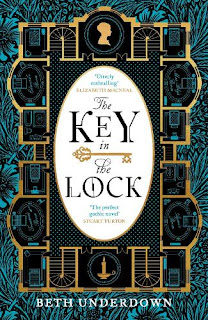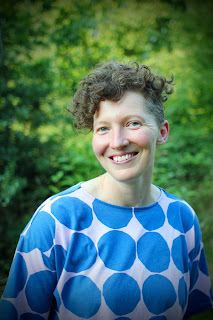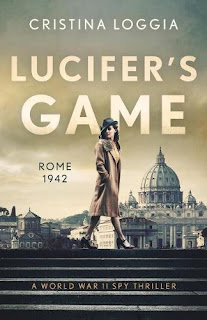Meet Beth Underdown Author Of The Key In The Lock
This fortnight we're featuring the historical side of the thriller genre with Beth Underdown's The Key In The Lock: war, love and secrets with a gothic thread running right through.
Beth is a university lecturer in writing as well as a successful novelist. She tells us her top writing advice for budding writers; how she goes about researching a place or historical period; and what she likes to binge watch on TV for a break!
Download the ebook of The Key In The Lock from Amazon or buy the paperback from Thriller Women's list at Bookshop.org. NB: if you buy books through this link we may earn a commission from bookshop.org, whose fees support independent bookshops.
TW: Congratulations Beth on publishing your second novel The Key In The Lock. Your first, The Witchfinder's Sister, was a great success. Did you feel pressure writing your second and what particular challenges did you face - or was it easier the second time round?
BU: Writing my second novel was definitely a very different experience. Publishing industry wisdom says that you should try to finish your second novel before your first novel comes out; I can see why that gets said, but personal circumstances meant that working seriously on a new book just wasn’t possible for me in the run-up to The Witchfinder’s Sister coming out. As a result, I felt like I was already ‘behind’ - but I realise now that my agent Nelle Andrew was right (as she always is): good books will always be good books, and readers will be glad whenever they come along.
When I did embark properly on The Key In The Lock, I think the biggest challenge came from attempting something quite different. While I’d loved working on The Witchfinder’s Sister, I wanted to find out whether I could invent a tight and twisty plot (not usually an option when you’re working with real history). So I spent quite a long time working on plot, learning as I went along. The only thing that was easier second time around was the knowledge that I could finish a book-length work – knowing that was reassuring at those tougher writing moments.
TW; As well as being a novelist you are a Lecturer in Creative Writing at The University of Manchester. How do you juggle both roles?
BU: It helps that my classroom teaching is mostly concentrated into five months of the year, so I do get a chunk of the year that’s quieter and which lets me focus more on writing. The roles do feed each other, though. Teaching makes me think more about how and why I write, and helping other writers also gives little regular boosts of self-worth that arrive independently from how I might be feeling about my writing life. That can be very useful sometimes!
TW: What's your advice to students who are writing thrillers?
BU: Oo, loads of advice! With thrillers, it’s important that the plot really propels the reader. For me, the juicy challenge is to try to marry this up really firmly with character, so that everyone’s motivations are really clear and the reader can believe in the timing and nature of their actions.
TW; As well as being a novelist you are a Lecturer in Creative Writing at The University of Manchester. How do you juggle both roles?
BU: It helps that my classroom teaching is mostly concentrated into five months of the year, so I do get a chunk of the year that’s quieter and which lets me focus more on writing. The roles do feed each other, though. Teaching makes me think more about how and why I write, and helping other writers also gives little regular boosts of self-worth that arrive independently from how I might be feeling about my writing life. That can be very useful sometimes!
TW: What's your advice to students who are writing thrillers?
BU: Oo, loads of advice! With thrillers, it’s important that the plot really propels the reader. For me, the juicy challenge is to try to marry this up really firmly with character, so that everyone’s motivations are really clear and the reader can believe in the timing and nature of their actions.
My advice would be to spend time dismantling thrillers you love (and if they’re similar to what you’d like to write, even better). Read a book two or even three times and then write a quick summary of what happens in each chapter (not why, just what happens). Pare your summary down until it’s one A4 page, and then have a look at the plot shape. What are the questions/sources of tension at the outset? How and when are they escalated? How and when are they resolved? It sounds a bit negative, but I think it’s a good sign if you can put your finger on the weakest part of a thriller you love. Is there anything that feels slow or flabby or coincidental? Being able to look at it this way doesn’t mean you don’t love the book, just that you’re starting to see it as a book mechanic would.
TW: The Key In The Lock is an historical thriller, set in the late nineteenth century and during the First World War. What is it about that period that excites you?
BU: One of the places I started with this novel was a fascination with how and when the Victorian period ended. I became interested in people who lived long lives which extended from the Victorian period, through the Great War into the modern era. How did these people see the world? How did their thinking change?
TW: The Key In The Lock is an historical thriller, set in the late nineteenth century and during the First World War. What is it about that period that excites you?
BU: One of the places I started with this novel was a fascination with how and when the Victorian period ended. I became interested in people who lived long lives which extended from the Victorian period, through the Great War into the modern era. How did these people see the world? How did their thinking change?
The usual way of thinking about the Great War is that it disrupted people’s routines, made them take on new roles and maybe become more outward-looking. So I got interested in working on a character for whom that wasn’t the case – somebody who felt the world was changing around them, while her small corner of it stayed the same. I also got very interested in the end of the war and demobilisation. I had never thought closely about how things took a long time to get back to normal, and what life was like while that was happening.
TW: Themes of death, love and grief permeate The Key In The Lock and we see the main character, Ivy grow from being an idealistic teenager to a disappointed mature woman. How did you manage to move between the timelines so skilfully, gradually revealing Ivy's story?
BU: Thank you for saying I did it skilfully! I tried to. I was working from the feeling that when something traumatic happens we can get, in a certain way, stuck in the stage of life when it happened – never questioning the feelings and perceptions we had at the time. I liked the idea of an older character revisiting what her younger self was thinking and feeling at a traumatic moment in her younger life – and maybe being led to think differently about not only the past but also her present. Figuring out what order to reveal things in, though, was HARD, and took a lot of editing.
TW: Themes of death, love and grief permeate The Key In The Lock and we see the main character, Ivy grow from being an idealistic teenager to a disappointed mature woman. How did you manage to move between the timelines so skilfully, gradually revealing Ivy's story?
BU: Thank you for saying I did it skilfully! I tried to. I was working from the feeling that when something traumatic happens we can get, in a certain way, stuck in the stage of life when it happened – never questioning the feelings and perceptions we had at the time. I liked the idea of an older character revisiting what her younger self was thinking and feeling at a traumatic moment in her younger life – and maybe being led to think differently about not only the past but also her present. Figuring out what order to reveal things in, though, was HARD, and took a lot of editing.
TW: You evoke rural Cornwall in the novel. Why did you choose that area for a setting and what research did you do?
BU: Setting is really important for me, and for this book the setting was the first thing I decided on. I wanted to write about Cornwall but a different Cornwall than we might visualise from Poldark; The Key In The Lock isn’t about plunging cliffs, but deep woods and dark, secret lanes. On the recommendation of the writer Wyl Menmuir, I went for a walk around the old gunpowder works at Kennall Vale, which is a magic place, and I knew that a powder works was what I wanted for the book. Most of my reading, though, was to try to get a sense of the two different periods – 1888 and 1918/19.
BU: Setting is really important for me, and for this book the setting was the first thing I decided on. I wanted to write about Cornwall but a different Cornwall than we might visualise from Poldark; The Key In The Lock isn’t about plunging cliffs, but deep woods and dark, secret lanes. On the recommendation of the writer Wyl Menmuir, I went for a walk around the old gunpowder works at Kennall Vale, which is a magic place, and I knew that a powder works was what I wanted for the book. Most of my reading, though, was to try to get a sense of the two different periods – 1888 and 1918/19.
TW: if you didn't write in this genre, which other/s would you like to write in?
BU: I’d like to have a go at modern procedural crime, but I’m scared of the research! I’d like to write an Atwood-style dystopia maybe. Something non-historical. Over lockdown, I was working on a sitcom screenplay, and I’d love to work on screen adaptations one day. I’m also (very slowly) working on a memoir.
TW: Any exclusive on what your third book will be about?
BU: One way or another, it’ll be about an explorer.
TW: What do you like to do to relax at the end of a working day?
BU: On weekday evenings, I’m very boring! When it’s light enough, I’ll walk – otherwise, I’ll potter about and make the tea, or binge comfort telly. Nothing too tense – The Bold Type and Call My Agent are recent favourites. I’m usually too wiped to read much in the evening: I took a proper break over Christmas and read loads, which felt lovely.
Quick fire questions:
BU: I’d like to have a go at modern procedural crime, but I’m scared of the research! I’d like to write an Atwood-style dystopia maybe. Something non-historical. Over lockdown, I was working on a sitcom screenplay, and I’d love to work on screen adaptations one day. I’m also (very slowly) working on a memoir.
TW: Any exclusive on what your third book will be about?
BU: One way or another, it’ll be about an explorer.
TW: What do you like to do to relax at the end of a working day?
BU: On weekday evenings, I’m very boring! When it’s light enough, I’ll walk – otherwise, I’ll potter about and make the tea, or binge comfort telly. Nothing too tense – The Bold Type and Call My Agent are recent favourites. I’m usually too wiped to read much in the evening: I took a proper break over Christmas and read loads, which felt lovely.
Quick fire questions:
TW: Writer you'd most like to be compared to?
BU: Hilary Mantel.
TW: Writer you tell your students to read?
BU: It’s different for each student! I point them to things that might speak to their work, and I encourage them to read what’s coming out in their different fields right now.
TW: Book on your bedside table at the moment?
BU: The Whalebone Theatre, which is coming in May this year and is fantastic so far. After that it’ll be How To Paint A Dead Man by Sarah Hall.
TW: Your lucky charm?
BU: I don’t really like objects (apart from books!) but I do have an Alan Measles toy from the Grayson Perry’s Art Club exhibition who sits on my desk as a protective spirit.
BU: Hilary Mantel.
TW: Writer you tell your students to read?
BU: It’s different for each student! I point them to things that might speak to their work, and I encourage them to read what’s coming out in their different fields right now.
TW: Book on your bedside table at the moment?
BU: The Whalebone Theatre, which is coming in May this year and is fantastic so far. After that it’ll be How To Paint A Dead Man by Sarah Hall.
TW: Your lucky charm?
BU: I don’t really like objects (apart from books!) but I do have an Alan Measles toy from the Grayson Perry’s Art Club exhibition who sits on my desk as a protective spirit.
TW: If I’m not writing I'll be found ...
BU: Outside.
By day, Ivy Boscawen mourns the loss of her son Tim in the Great War. But by night she mourns another boy - one whose death decades ago haunts her still.
For Ivy is sure that there is more to what happened all those years ago: the fire at the Great House, and the terrible events that came after. A truth she must uncover, if she is ever to be free.
BU: Outside.
Thanks Beth!
More about The Key In The Lock:
I still dream, every night, of Polneath on fire. Smoke unfurling out of an upper window and a hectic orange light cascading across the terrace.By day, Ivy Boscawen mourns the loss of her son Tim in the Great War. But by night she mourns another boy - one whose death decades ago haunts her still.
For Ivy is sure that there is more to what happened all those years ago: the fire at the Great House, and the terrible events that came after. A truth she must uncover, if she is ever to be free.




Comments
Post a Comment